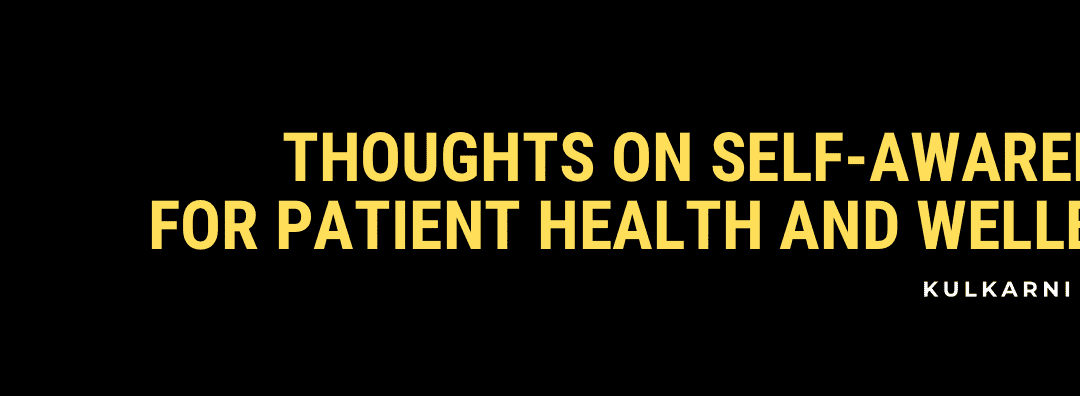Dr Ketan Kulkani
Physician | Entrepreneur I Researcher | Author | Coach | Founder
Dr Nia D Thomas
Director of Thoughts and Ideas | Thinker | Podcaster | Blogger
Relationships are the greatest predictor of happiness and wellbeing. Relationships make the world go around and when one party has dominance in that relationship, whether that be through seniority, knowledge, expertise, money or simply confidence, then there is the potential for significant impact on the other party. Healthcare is no exception.
In this article, we’ll set out some thoughts and research about the relationships between clinicians, healthcare professionals and their patients and the impact the self awareness of those clinicians and professionals have on their patients’ health and wellbeing.

Ketan lives in Canada and is a physician, clinician researcher, author, coach and entrepreneur. In his academic role, he is actively engaged with patients with complex medical disorders. He has had a very successful research programme (more than 125 peer reviewed published papers in leading journals) primarily assessing treatment related to toxicity, survival outcomes and blood clots in high-risk, particularly cancer, patients. With his passion for leadership, innovation and coaching, he has done longitudinal leadership training for several years, became a certified coach and focuses on SELF (success, leadership, entrepreneurship and primarily finances). Earlier, this year he published a best-selling book ‘The Legendary Quest’ centred around the issue of self-awareness and inner and outer excellence with his friend and colleague Dr Francis Yoo. Overall, his work is focussed on adding significant value to all professionals globally and those he interacts with. He is particularly interested in sharing his work to battle the global pandemic of burnout, work and personal dissatisfaction. He was recently featured in Brainz Magazine.

Nia is a UK based leader who has spent over 20 years working in the public sector across local government, the National Health Service and civil service, predominantly in Wales and in the last few years, in England. She currently works as an Assistant Director in a children’s charity. Throughout her career, Nia has been interested in working relationships; essentially the dynamics between people and the impact both good and bad relationships have on individuals and their ability to effectively deliver their work. This led her to develop an interest in self-aware leadership through the lenses of self-awareness, leader effectiveness and leadership at all levels. Self-aware leadership became the focus of Nia’s doctoral research and in September ‘22, Nia launched The Knowing Self Knowing Others Podcast to take her research from academia to the office.
For millennia across the globe, awareness of the self has been well recognized as a core principle of life and living. Its importance is well documented in ancient literature, modern literature, Eastern and Western philosophy and wisdom, doctrinal religions, spirituality, yoga, and even mysticism! Such is its impact that now, a modern scientific field of quantum biology has been recognized and is gaining wide popularity. The concept of awareness is based on the idea that we are not our mind, brain (our ‘intellect’), or body. Rather, as we say in The Legendary Quest, we are the “consciousness” that is aware of our mind, body, thoughts, feelings, behaviours and actions. The value of self-awareness is that it allows us to develop the thoughts, emotions, and patterns of behaviour that are supportive of our authentic needs and desires, rather than running contrary to them.
Nia’s definition of self-awareness has three layers, referred to as reflection, recognition and regulation. To develop a ‘whole’ self-awareness, each of these layers need to be present and one overlays on another.
Reflection is about looking inward. When we say we need to ‘hold a mirror up to ourselves’, this is the layer of self-awareness we’re referring to.
Recognition is about acknowledging that we have an impact on other people and that other people hold opinions, thoughts and assumptions about us.
Regulation is that highest level of awareness that comes from the acknowledgement that ‘we can’t change others, we can only change ourselves’. But, in changing ourselves, we change how other people respond to us. How do people respond when you don’t say please and thank you? How do they respond when you do?
In The Legendary Quest, Ketan discusses the awareness model used to bring self-awareness to the forefront of one’s consciousness. The model primarily centres on emphasising conscious awareness and cognitive attention as the primary human asset. It shows how one can craft a “life by design” by having authentic goals, recognizing core values and then managing one’s thoughts and emotions in alignment with the same. Furthermore the model is all encompassing and explains resolution of restrictive thoughts and emotions, identifies common mental traps, recognizes the importance of subconscious patterns, discusses growth and restrictive mindset, and highlights the value of gratitude, forgiveness and happiness in the now. Lastly the model highlights how inner excellence drives outer excellence in the form of success, finances and personal leadership to ultimately become the CEO of one’s life.
While the model appears to be complex, it truly is very simple and rests on time tested principles of life, ancient and modern scriptures and books alike, scientific evidence, and principles of psychology. The model can be immediately applied to all areas of life and can act as a catalyst in one’s life to immediately move the needle. Further, we have presented several simple and easy to apply exercises that can cement the concepts in one’s gray matter.
Nia and Ketan agree that self-awareness is not an abstract concept and over the years a clear school of thinking has emerged that defines self-awareness as both inward looking (i.e. what I think of me) and outward looking (i.e. what you think of me) Even when different terminology is used, Nia and Ketan’s models agree that the self has to develop good reflective practices to really get to know and understand the self, and the self’s impact on others.
If you read the academic literature about self-awareness, you’ll come across a number of articles talking about healthcare and the importance of self-awareness and reflection in clinical practice. Here are just a few articles that connect self-aware practice with patient care and recovery: Novack et al., 1999, Freshwater, 2002, Morgan, 2009, Bawafaa et al., 2015, Beyrer, 2015.
Novack et al. (1999) talks about how the emotions of medical students have the potential to impact on their relationship with patients and consequently, patient wellbeing. The study talks about the need for self-awareness to be included in medical training programmes, to make sure that doctors have the skills they need to help them manage their own stresses to avoid any negative impact their behaviour may have on their patients.
Freshwater (2002) talks about self-awareness and reflective practice in nursing care and how being your ‘authentic self’ can support therapeutic healing in patients. The study talks about the implication for nurses as self-aware practitioners who need to build rapport and have sympathy for and empathy with patients to support them to get back to good health.
Morgan (2009), talks about reflective practice and self-awareness in the public health workforce in Wales, saying that having an open mind and being self-aware are prerequisites for reflection. Beyrer (2015, p.1725) backs this view. Rasheed et al. (2019) go further and say that self-awareness helps nurses develop their critical thinking and clinical decision-making skills.
Bawafaa et al. (2015) talk about how resonant leadership, which is based on the ideas underpinning emotional intelligence impacts on on nurses’ structural empowerment and job satisfaction.
Laschinger et al. (2014), also focus their study on resonant leadership in the nursing profession which again supports the idea that emotional intelligence-based constructs are relevant to healthcare.
Even the Resonant Leadership Scale developed by Cummings (2006) has its foundations within the healthcare sector in Canada (Cummings, 2004).
It must be recognised that as health conditions are becoming more complex, the burden on professional healthcare institutions is increasing at the same time as costs are spiralling. There is increasing global inequality in healthcare: in the era of rampant burnout, mental health disorders and distress, self-awareness is a critical factor for all healthcare professionals, both for them as individuals and their work. Self-awareness influences happiness in the workplace, professional fulfilment, and career longevity as well as clinical decision making and relationships with patients. For healthcare administration and leadership teams, self-awareness is a key component in promoting organisational mission and vision, and understanding teams and the operationalisation of healthcare practice.
Nia and Ketan agree that there are very real, practical steps that can be taken to develop self-awareness, from implementing individualised reflective practices to including feedback from others….
● Self-reflection: individuals can use meditation (of any type of their choice) to get to know their physical, mental and emotional states, from recognising aches and pains to recognising feelings and thoughts. Journaling is also a helpful way of surfacing and naming emotions. As Alison Lagier says, in Episode 7 of The Knowing Self Knowing Others Podcast, reflective practice was a foundational element of her mental health nurse training and continued into her practice in all mental health care settings. This influenced her ongoing self-awareness and relational skills throughout her career.
● Psychometric tests: we’ve all heard of Myers Briggs, Strengths Finder 2.0 and DISC. These tools are frequently used to help us identify our preferences and open up a debate about further self-learning. They’re also helpful team building tools that help us understand why we gravitate to some people and find it difficult to work with others. Through understanding comes greater ability to move beyond those difficulties and break down barriers.
● 360 Degree assessments: 360s are a way of drawing others into your reflective practice, by giving them an avenue to feed back in a safe and constructive way, provided the process is well managed and facilitated. This links to the recognition layer of Nia’s diagram.
● Supervision: clinical and management supervision with a line manager or respected, experienced practitioner can be helpful in pinpointing areas where you can improve, cultivate your strengths, and also help to bring awareness to your blind spots. Group clinical supervision can also be helpful in generating a reflective practice habit and giving healthcare professionals time to step away from their clinical work for that essential reflection time.
● Vulnerability: as self-awareness builds, leaders should demonstrate authenticity as a way to generate open problem solving and learning, especially in complex organizations
● Feedback and coaching: The value of feedback, coaching and mentorship is unparalleled for enhancing self-growth and performance.
With self-awareness comes both enlightenment and choices. It allows us to recognize the space between our thoughts, emotions and actions and our conscious awareness. With enlightenment about ourselves and out modus operandi in different situations comes an awareness about others and how they respond to us. That in turn creates a virtuous cycle of upskilling and increasing self-awareness. An increased self-awareness ultimately gives us choices on our modus operandi in different situations. If we know we need space following a difficult conversation, we can choose to give ourselves space. If we know we need to reflect on a difficult question before offering a helpful answer, we give ourselfves that time.
Nia has learnt to sleep on an email before clicking that send button and jumping on the train of no return. Ketan has learnt to recognize and appreciate opposing or polar views before responding. Nia has learnt to be transparent in answering those complex questions with an open and vulnerable ‘I don’t know’, and backing it up with a ‘but I can find out’. Ketan has learnt active listening and assessing his own cognitive biases before jumping to conclusions. Both Ketan and Nia have recognized the importance of empathy towards others and themselves in their work and practice. Through self-aware empathy, we can all become better every day and make meaningful contributions.
When we’re thinking about the lives of patients in the hands of clinicians, self-awareness is a critical skill that cannot be underestimated. It’s a skill to be discussed, debated, honed and revisited daily, weekly, monthly and whenever is needed – for the benefit of both the carer and the cared-for, whose lives and deaths are in the hands of strangers.
References
● BAWAFAA, E., WONG, C. A. & LASCHINGER, H. (2015). The influence of resonant leadership on the structural empowerment and job satisfaction of registered nurses. Journal of Research in Nursing, 20, 610-622.
● BEYRER, C. (2015). The art of medicine. The proper study of mankind. The Lancet, 386, 1724-1725.
● CUMMINGS, G. (2004). Investing relational energy: the hallmark of resonant leadership. Nursing Leadership (Toronto, Ont.), 17, 76-87.
● CUMMINGS, G. G. (2006). Hospital restructuring and nursing leadership: a journey from research question to research program. Nursing administration quarterly, 30, 321-329.
● FRESHWATER, D. (2002). Therapeutic Nursing: Improving Patient Care Through Self-Awareness and Reflection, London, SAGE Publications Ltd.
● KULKARNI, K., YOO, F. (2022). The Legendary Quest: For professionals seeking inner and outer excellence and authentic fulfilment. Available on Amazon (https://www.amazon.ca/Legendary-Quest-Professionals-Excellence-Fulfillment/dp/B 09TWPHFFR)
● LASCHINGER, H. K. S., WONG, C. A., CUMMINGS, G. G. & GRAU, A. L. (2014). Resonant leadership and workplace empowerment: the value of positive organizational cultures in reducing workplace incivility. Nursing economic.
● MORGAN, G. (2009). Reflective practice and self-awareness. Perspectives in Public Health, 129, 161-162.
● NOVACK, D. H., EPSTEIN, R. M. & PAULSEN, R. H. (1999). Toward creating physician-healers: fostering medical students’ self-awareness, personal growth, and well-being. Academic Medicine, 74, 516-20.
● THOMAS, N., (2021). Knowing Self, Knowing Others: A Critical Exploration of Self-Awareness and Its Relevance to Leader Effectiveness Across All Levels of the Welsh Public Service. University of South Wales (United Kingdom)

